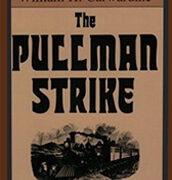The Pullman Strike by Rev. William H. Carwardine
The epub format below is for your Apple and Android devices including Send-to-Kindle.
As you may know, Amazon has changed to the epub format to use with the Send-to-Kindle program. A great feature of the Send-to-Kindle program is that the file will go directly to your Library folder, and not have to be searched for in ES File Explorer or another app. If you use the mobi format in Send-to-Kindle, you will now get an error message. You can see instructions about Send to Kindle at https://www.amazon.com/gp/sendtokindle/email.
If you or your students want to download directly from this web site to an Amazon device, you can use the mobi format below. When you find the mobi file in ES File Explorer, it will then open in the Kindle app on your tablet. If you download an epub file to your Amazon tablet, it will also open if you have an app such as Overdrive on your tablet. The Kindle app offers an excellent reading experience to start with. Overdrive may need some customization of font size.
Download mobi file here.
From Goodreads
During the heroic Pullman strike and boycott of 1894, a young Methodist minister defied the conventions of company-town self-censorship by writing this searing expose of the dictatorial and penny-pinching regime of multimillionaire George M. Pullman. That the Rev. Carwardine suffered immediate exile from his Pullman church suggests how deeply threatened the giant railroad manufacturing and operating company was by his plainly written book. Filled with appreciation for meaningful details of the everyday lives of diverse workers with common problems, and with a balanced admiration for the leadership of Eugene V Debs, The Pullman Strike vividly shows how a great experiment in industrial unionism like the American Railway Union could arise. Aware of the vast power and ruthlessness of the Pullman Company, Carwardine also suggests why the union was unable to prevail.
From the Back Cover of a Print Edition
Pullman was built as a company town on the edge of Chicago to turn out sleeping cars.
In the prettified tenements that fooled passing journalists, hungry workers crowded five families to a faucet. After severe wage cuts by the Pullman Company during the recession of 1893, the workers joined Gene Debs’ American Railway Union and struck. A Pullman preacher, the Rev. William Carwardine, spoke up on their behalf and detailed the conditions of their lives in this book of 1894. “Never did men have a cause more just,” he said “and never did corporation with equal pretenses grind men more unmercifully.”




Leave a Reply
Want to join the discussion?Feel free to contribute!